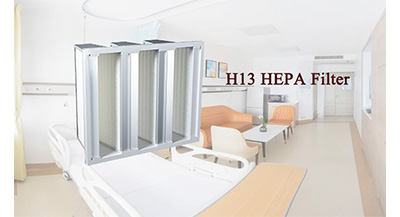 May 16, 2024
May 16, 2024
In the quest for cleaner air and healthier living environments, medical grade H13 filters have emerged as a superior option. These filters, a type of High-Efficiency Particulate Air (HEPA) filter, are celebrated for their exceptional ability to capture a wide range of airborne pollutants. This article delves into the specifics of H13 filters, their benefits, applications, and why they are a crucial component in modern air purification.

What are Medical Grade H13 Filters?
Medical grade H13 filters are a category within the HEPA filter family, designed to capture 99.95% of airborne particles as small as 0.1 microns. This includes common contaminants such as dust, pollen, mold spores, bacteria, and even some viruses. The term medical grade signifies their use in environments where high standards of air purity are essential, such as hospitals, laboratories, and cleanrooms
How Do H13 Filters Work?
These filters function by forcing air through a fine mesh that traps harmful particles. The effectiveness of H13 filters lies in their dense, fibrous structure, which can capture particles significantly smaller than those caught by standard HEPA filters, which typically filter particles down to 0.3 microns. The finer filtration capability makes H13 filters particularly effective in environments where air quality is critical.
Benefits of Using H13 Filters
Superior Filtration Efficiency: With the ability to capture ultrafine particles down to 0.1 microns, H13 filters provide a higher level of protection against airborne contaminants compared to standard HEPA filters.
Health Protection: By removing a wide range of pollutants, including allergens, bacteria, and viruses, these filters contribute to improved respiratory health and overall well-being.
Versatility: H13 filters are used in a variety of settings, from medical facilities to residential homes, ensuring high air quality wherever they are installed.
Longevity: These filters are designed to last longer than standard filters, often requiring replacement only every 6 to 12 months, depending on usage and air quality conditions
Applications of H13 Filters
Due to their high efficiency, H13 filters are employed in numerous applications:
Medical Settings: Hospitals and clinics use these filters to maintain sterile environments, preventing the spread of infections.
Laboratories: Research labs depend on H13 filters to protect sensitive experiments from contamination.
Commercial and Residential Use: Increasingly, businesses and homeowners are turning to air purifiers with H13 filters to ensure clean air in offices and homes, especially in areas with high pollution levels or during allergy seasons
Conclusion
Medical grade H13 filters represent a significant advancement in air purification technology. Their superior filtration capabilities, health benefits, and versatility make them a valuable addition to any environment where clean air is a priority. Whether in a medical setting, laboratory, or home, H13 filters ensure that the air we breathe is as free from contaminants as possible, promoting better health and well-being for all.
In summary, investing in an air purifier with an H13 filter is a smart choice for anyone looking to improve air quality and protect against airborne pollutants. As our understanding of air quality's impact on health continues to grow, so too does the importance of using advanced filtration technologies like medical grade H13 filters.

